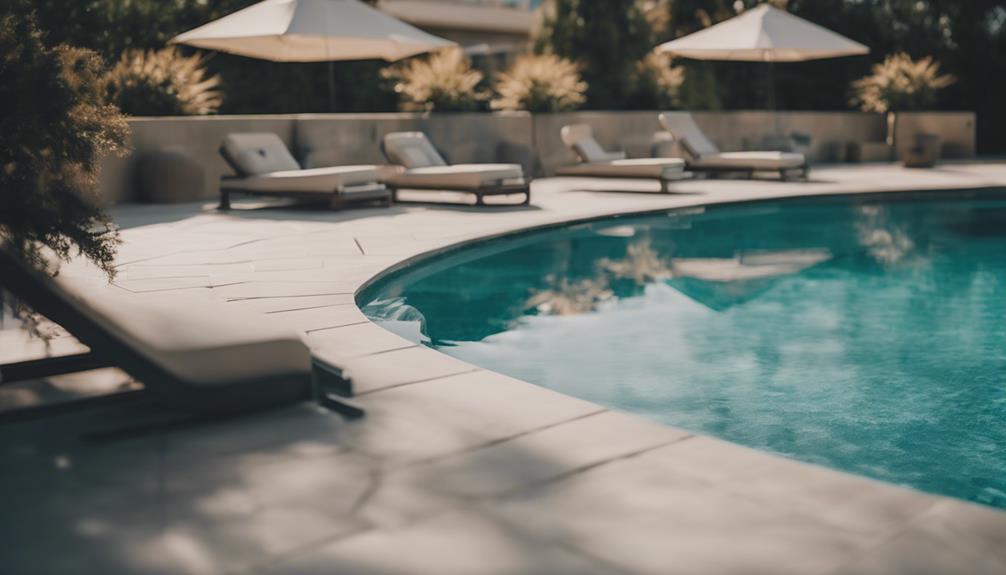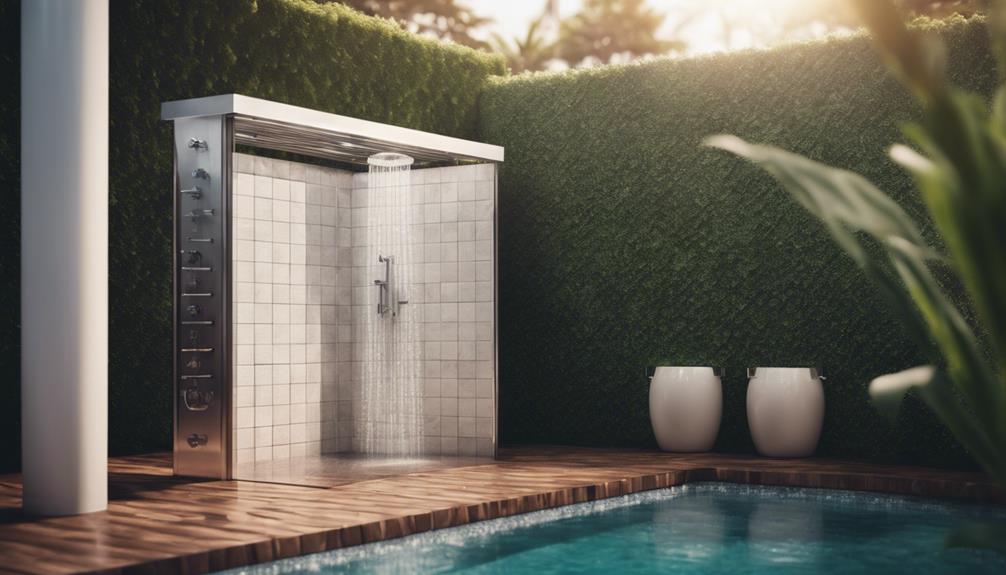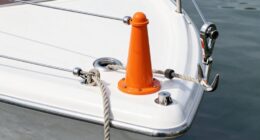Rainwater can hinder pool construction by saturating soil, impacting foundation stability, and causing warping. Installing drainage systems and using protective measures like rain gutters can help mitigate risks. Additionally, prolonged moisture exposure may lead to structural issues, particularly for gunite pools. To guarantee efficient installation, it's important to monitor weather forecasts and adjust schedules accordingly. Proper maintenance and monitoring of water quality are essential as rainwater can dilute pool chemicals and introduce contaminants. Understanding the impact of rainwater on construction is crucial for successful pool projects.
Key Takeaways
- Rainwater can saturate soil, compromising pool foundations.
- Excessive rain delays construction, especially for gunite pools.
- Proper drainage systems and rain gutters mitigate risks.
- Monitoring weather forecasts is crucial to plan construction.
- Tarps and drying techniques help maintain a dry construction area.
Impact of Rainwater on Construction Area
The impact of rainwater on the construction area can significantly impede pool installation progress and potentially lead to structural complications. Excessive rain can saturate the soil, affecting the stability of pool foundations and extending the drying time required for structures like gunite pools.
This prolonged moisture exposure can result in warping or shifting of the foundation, compromising the integrity of the pool. To mitigate these risks, contractors often employ strategies such as installing rain gutters, implementing efficient drainage systems, and using protective tarps during construction.
Structural Damage Caused by Rainwater
How can rainwater impact the structural integrity of pools during construction?
Excessive rainwater accumulation poses a significant risk to pool construction projects. Soggy soil resulting from prolonged water exposure can lead to the warping of pool foundations, compromising their stability. This can be particularly detrimental for gunite pool structures, which require adequate drying time.
To mitigate structural damage caused by rainwater, contractors implement preventive measures such as installing rain gutters and efficient drainage systems to divert water away from the construction area.
Monitoring weather forecasts and adjusting construction schedules accordingly, alongside using protective tarps and effective drying techniques, are essential practices to maintain the structural integrity of pools during installation.
Effects of Rainwater on Water Quality

Excessive rainwater infiltration can impact not only the structural integrity of pools during construction but also the water quality within the pool itself. When rainwater enters the pool, it dilutes pool chemicals, affecting the water balance and potentially introducing debris, bacteria, and algae. Contaminated pool water requires thorough testing and chemical rebalancing to guarantee safe swimming conditions. To provide a clearer picture, here is a table showcasing the effects of rainwater on water quality:
| Effects of Rainwater on Water Quality | |
|---|---|
| Dilution of pool chemicals | Introduction of debris, bacteria, and algae |
| Disrupted water balance | Increased need for testing and chemical rebalancing |
Efficient Pool Installation & Maintenance
Discover the key strategies for maximizing efficiency in pool installation and maintenance with expert guidance from Shoreline Pools. Efficient pool installation involves ensuring the construction area remains dry to support machinery and plumbing. Gunite pool structures require adequate drying time, which can be compromised by excessive rain, potentially leading to structural issues. Proper drainage systems, rain gutters, and monitoring of weather patterns are essential to prevent water accumulation that can impact pool foundations.
Additionally, above-ground pools necessitate stable foundational support to avoid structural damage. Shoreline Pools offers professional insights and tailored construction plans to facilitate seamless pool projects, ranging from chemical balancing to pool design and installation. Contact Shoreline Pools at (203) 357-1544 for expert assistance in achieving the best pool installation and maintenance results.
Importance of Avoiding Rainwater During Construction

During pool construction, the presence of rainwater poses a significant threat to the structural integrity and timely completion of the project. Rainwater can lead to delays and structural issues, particularly for gunite pools that require proper drying time. Soggy soil from water accumulation may warp pool foundations, impacting stability.
To avoid these complications, it is essential to schedule construction during drier seasons and monitor weather patterns regularly. Professional contractors utilize effective methods such as tarps, rain gutters, and drainage systems to keep the construction area dry.
Frequently Asked Questions
How Can Rainwater Impact the Timeline of Pool Construction?
Rainwater can impact pool construction timelines by causing delays, structural issues, and affecting the drying process of pool structures. Contractors must monitor weather patterns, use effective drainage systems, and halt construction during rainy periods to prevent complications.
What Measures Can Be Taken to Prevent Rainwater Damage During Pool Installation?
To prevent rainwater damage during pool installation, implementing effective drainage systems, monitoring weather patterns, and utilizing protective covers are crucial. Professional contractors strategically plan construction schedules and utilize methods to keep the construction area dry, ensuring smooth installations.
Does Rainwater Affect the Durability of Pool Materials?
Rainwater can compromise the durability of pool materials by causing warping or foundation issues due to soggy soil, affecting the structural integrity. Proper drainage and weather monitoring are essential to safeguarding the longevity of pool constructions.
Can Rainwater Affect the Warranty of a Newly Installed Pool?
Rainwater accumulation during pool installation can impact the warranty of a newly installed pool. Extended drying time due to rain delays can lead to structural issues, potentially voiding warranties. Proper drainage and construction scheduling are essential to avoid warranty implications.
Are There Specific Seasons to Avoid for Pool Construction Due to Rainwater?
Seasonal considerations are essential for pool construction. Avoid wet seasons like summer to prevent rainwater-related delays and structural issues. Off-season installations increase smooth construction probabilities. Monitoring weather patterns aids in scheduling, and contractors employ effective methods to keep pool areas dry during rain.
Conclusion
In the intricate dance of pool construction, rainwater plays a disruptive role, threatening the stability and longevity of installations. The relentless downpour can weaken structures, contaminate water, and hinder progress.
By implementing strategic measures to counteract the impact of rain, construction teams can guarantee the seamless completion of projects, creating pools that stand as resilient havens amidst the storm of challenges.










